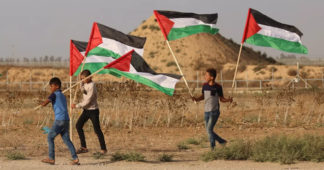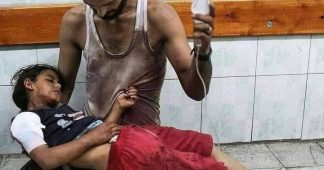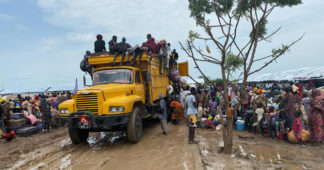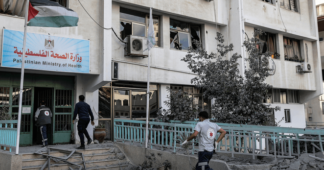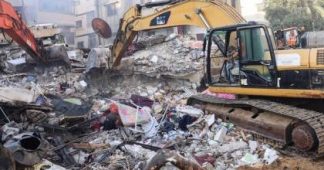WHO pleads for immediate reversal of Gaza evacuation order to protect health and reduce suffering
WHO joins the wider United Nations in appealing to Israel to immediately rescind orders for the evacuation of over 1 million people living north of Wadi Gaza. A mass evacuation would be disastrous—for patients, health workers and other civilians left behind or caught in the mass movement.
With ongoing airstrikes and closed borders, civilians have no safe place to go. Almost half of the population of Gaza is under 18 years of age. With dwindling supplies of safe food, clean water, health services, and without adequate shelter, children and adults, including the elderly, will all be at heightened risk of disease.
The Palestinian Ministry of Health has informed WHO that it is impossible to evacuate vulnerable hospital patients without endangering their lives. Vulnerable patients include those who are critically injured or dependent on life support. Moving them amid hostilities puts their lives at immediate risk.
The two Ministry of Health hospitals in the North of Gaza that continue to be operational, have greatly exceeded their combined 760-bed capacity with severe overcrowding. Of the thousands of patients with injuries and other conditions receiving care in hospitals, there are hundreds that are severely wounded and over 100 who require critical care. These are the sickest of the sick. Many thousands more, also with wounds or other health needs, cannot access any kind of care.
The compressed timeframe, complex transport logistics, damaged roads, and, above all, lack of supportive care during transport all add to the difficulty of moving them.
Furthermore, the four Ministry of Health hospitals in the south of Gaza are already at or beyond capacity, and lack the critical care capacity and supplies needed to treat additional patients.
The lack of medical supplies is already endangering patients and hampering health workers. Supplies which WHO had pre-positioned in Gaza have mostly been consumed.
On 9 October, WHO Director-General Dr Tedros Adhanom Ghebreyesus met with Egyptian President Abdel Fattah El-Sisi, who agreed to a WHO request to facilitate the delivery of health and other humanitarian supplies from WHO to Gaza via the Rafah crossing.
WHO has prepared medical supplies in its logistics hub in Dubai and is ready to deliver them to Areesh, Egypt—just 20 minutes from Rafah—as soon as landing permit is received. The supplies would be enough to care for more than 300,000 patients with a range of wounds and diseases.
WHO asks for the immediate establishment of a humanitarian corridor for their onward, safe delivery to health care facilities in Gaza, including via Rafah.
WHO reiterates its plea for humanitarian access for life-saving supplies and the delivery of fuel, water, and food; for protection under international humanitarian law for civilians, health workers and health infrastructure; and ultimately, for an end to hostilities and violence.
Some 1Mln People in Gaza Have No Safe Shelter From Israel’s Strikes – UNICEF
Oct 13, 2023
MOSCOW (Sputnik) – As many as 1 million people in the Gaza Strip are unable to find a safe shelter, with a large number of children among victims of Israel’s shelling carried out in response to the attack launched by Palestinian movement Hamas, the United Nations Children’s Fund (UNICEF) said on Friday.
“We are horrified by the scenes coming out of Gaza. Large number of children among the victims. 1 million people with nowhere safe to go. This is unacceptable and the violence should stop immediately,” the organization’s regional office in the Middle East and North Africa wrote on X, formerly known as Twitter.
Earlier in the day, the Israel Defense Forces (IDF) urged civilians of Gaza City to evacuate southward “for their own safety.” UN spokesman Stephane Dujarric said the Israeli military had also notified the UN that the population of Gaza north and the UN staff should relocate to southern Gaza within 24 hours. The UN urged Israel to rescind the order, saying that it was “impossible for such a movement to take place without devastating humanitarian consequences.”
On October 7, Hamas launched a surprise large-scale rocket attack against Israel from the Gaza Strip, prompting Israel to declare a state of war the following day and launch retaliatory strikes. On Monday, Israel ordered a complete blockade of the Gaza Strip, home to more than 2 million people, cutting off supplies of water, food and fuel. Both Israel and Palestine have reported over 1,000 deaths and thousands of injuries as a result of the escalation.
We remind our readers that publication of articles on our site does not mean that we agree with what is written. Our policy is to publish anything which we consider of interest, so as to assist our readers in forming their opinions. Sometimes we even publish articles with which we totally disagree, since we believe it is important for our readers to be informed on as wide a spectrum of views as possible.
